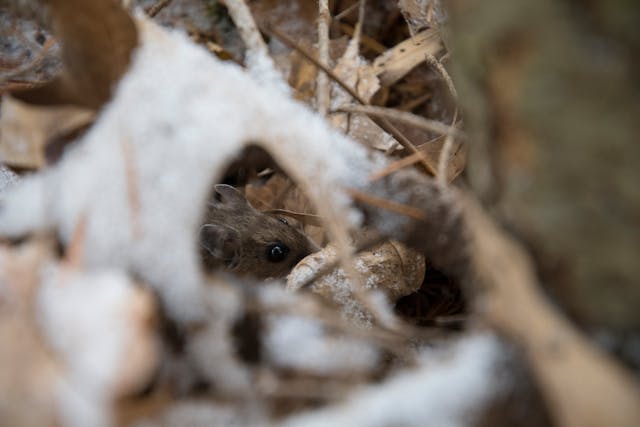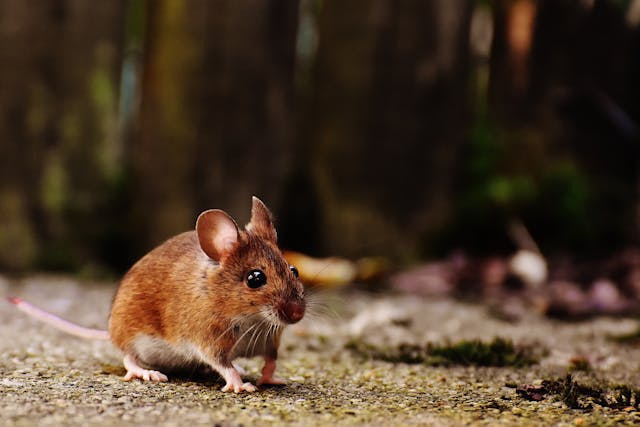Mice are elusive creatures, and if you’ve ever wondered whether they’re scurrying through your home when the lights go out, you’re definitely not alone.
The question, “Are mice nocturnal?” is a common one, especially when those faint, unsettling noises seem to echo through your house at night. It’s easy to assume mice are only active in the dark, but there’s more to their nighttime behavior than meets the eye.
In this blog, we’ll explore the nocturnal habits of these tiny invaders and why they thrive in the dark. From their need to avoid predators to their natural instincts for foraging and nesting under the cover of darkness, we’ll uncover why the night belongs to the mice and how you can take back control.
Are Mice Nocturnal?
So, the big question: Are mice nocturnal?
Yes, mice are primarily nocturnal. They’ve adapted to thrive in the nighttime, using the cover of darkness to evade predators and increase their chances of finding food undisturbed. This is why you might hear the telltale sound of scurrying feet after sundown. It’s likely mice going about their nightly routines.
Mice are naturally cautious, and being active at night helps them avoid predators like cats, birds, and even humans. When your home is quiet, they feel secure enough to forage for food, gather nesting materials, and explore.
By day, they hide in dark, tucked-away spots like walls, attics, or basements. But once the evening sets in, they rely on their senses to navigate and seek out food, taking advantage of the stillness and safety that nighttime brings.
Although mice don’t have the best vision, they compensate with other heightened senses that help them thrive in darkness. Their sense of smell, hearing, and touch (via their sensitive whiskers) are highly developed, making it easy for them to navigate even in pitch-black environments.
What Do Mice Do at Night?
Mice are opportunistic creatures, and their nightly routines revolve around survival. As the house quiets down, they begin their search for food, sneaking into kitchens and pantries to find any scraps.

Despite needing only a few grams of food daily, they’ll chew through boxes, bags, and even plastic containers to get to what they need. After satisfying their hunger, mice turn their attention to nest building.
Using soft materials like paper, insulation, or fabric, they create warm, secure spaces for their offspring, typically in hidden areas like behind walls or under appliances. These curious rodents also spend their nights exploring their surroundings, constantly on the lookout for new food sources or safer nesting spots to expand their territory.
Why You Should Be Concerned About Nocturnal Mice
The fact that mice are nocturnal makes detecting an infestation in its early stages challenging. Since they’re most active while you’re asleep, you might not notice their presence until the infestation has already grown.
However, it’s important not to underestimate the damage these night-dwelling rodents can cause. Mice can gnaw through materials like wood, plastic, and electrical wiring. This destructive behavior not only damages your property but also creates potential fire hazards.
Beyond the structural damage, mice pose a serious risk to your food supply. They are known carriers of bacteria and diseases, and their droppings, urine, and fur can easily contaminate any food they come into contact with, putting your family’s health at risk.
To make matters worse, mice reproduce at an alarming rate. A single pair can produce up to 60 offspring in a year, so even a minor issue can quickly escalate into a full-blown infestation if it isn’t addressed promptly. Taking swift action at the first sign of mice is essential to prevent further damage and protect your home.
Signs of Mice in Your Home
Since mice are nocturnal, you might not spot them during the day, but their presence often leaves telltale signs. One of the most prominent indicators is the discovery of small, dark droppings in areas like drawers, cabinets, or along baseboards.
You might also notice gnaw marks on food packaging, furniture, or walls, as mice tend to chew through various materials. Another sign to look for is nests—mice build these from shredded materials such as paper or insulation, so finding small piles of torn debris is a clue they’re nearby.
How to Keep Mice Out of Your Home

If you suspect mice are lurking in your home, it’s essential to act quickly. Here are some tips to prevent these nocturnal invaders from setting up shop:
- Seal Entry Points: Mice can squeeze through tiny cracks and gaps in your home’s foundation, walls, or roof. Make sure to seal any potential entry points with steel wool or caulk.
- Keep Food Sealed: Store food in airtight containers to prevent mice from accessing it. This includes pet food and birdseed, which can also attract rodents.
- Eliminate Clutter: Mice love hiding in cluttered areas like basements, attics, or garages. To reduce hiding spots, keep these spaces organized and free of debris.
- Set Traps: If you’ve already spotted signs of mice, consider setting traps in areas where they’re most active. Various types of traps are available, from snap traps to humane live-capture options.
proof. Pest Control Can Help
Are mice nocturnal? Definitely. But if you think mice are lurking in your home, don’t wait! Take action and get rid of these nocturnal invaders fast.
At proof. Pest Control, we’re experts in getting rid of mice and keeping them from returning. Whether you’ve spotted droppings or heard scratching at night, we’ve got the know-how to handle it. Our proven methods will kick mice out and make sure they stay gone.
Don’t let mice keep you up at night. Call proof. Pest Control, and we’ll handle these sneaky critters.

